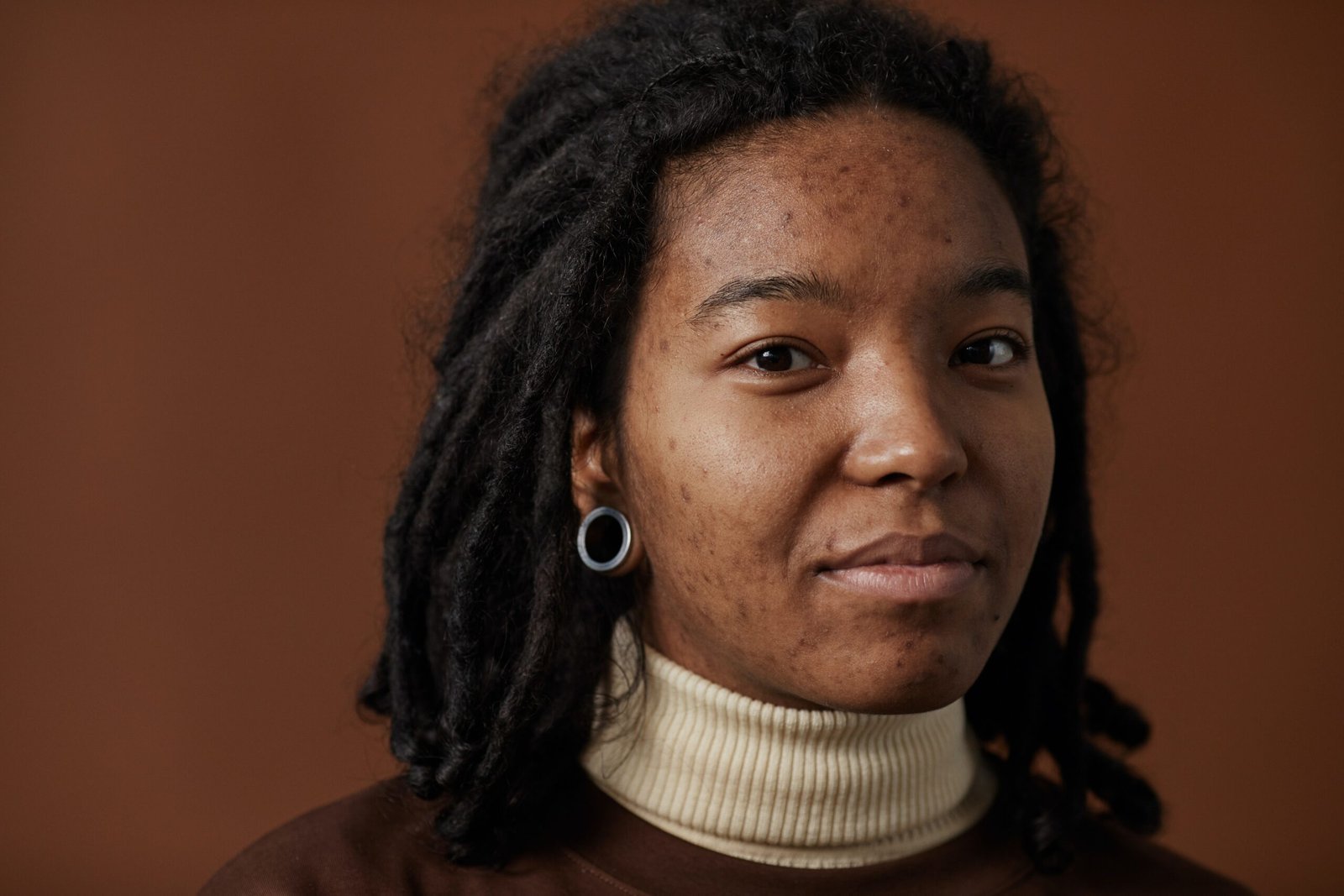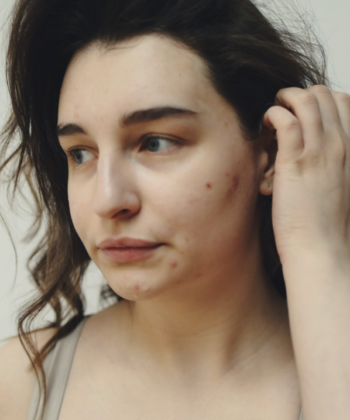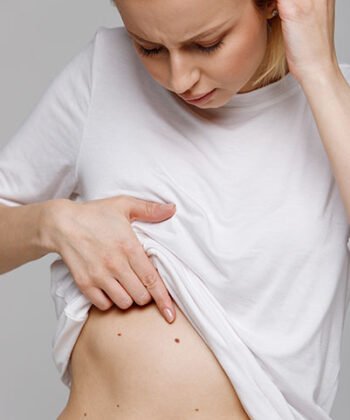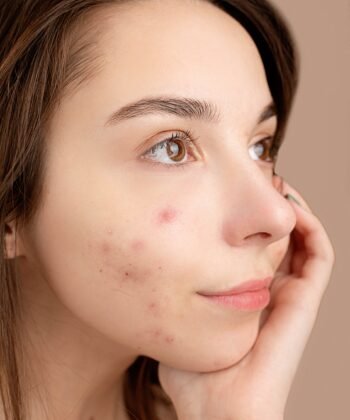Acne in Teens and Young Adolescents
Acne, also known as Acne Vulgaris, is one of the most common and long-lasting skin conditions in the Western world. It’s responsible for causing breakouts or spots in both young adolescents and adults, particularly on the face, neck, back and chest. Most commonly, it affects teenagers with around 95% of those aged 11-30 experiencing acne at some point in their lives. With such a high percentage, what exactly is causing this condition?
The sebaceous glands in our skin can produce oil called sebum. Excess sebum production and thickening of the lining of our pores can stop dead skin cells from shedding effectively. This results in clogging and blocking the pores. A bacteria that lives on everyone’s skin called cutibacterium acnes is also implicated in the development of acne. Recent publications have suggested that those people with acne have less diversity within the population of Cutibacterium acnes.

What is teenage Acne?
One of the reasons teenage acne flares is as a result of hormonal changes in the body that cause the glands under the skin to produce excess sebum. It is these hormones that play a major role in influencing how the sebaceous glands function. With the oil production picking up during puberty, the skin becomes greasier; blocking the pores, and causing spots to appear. The most visible areas for these to show is across the forehead, nose and chin also known as the T-zone. Acne can also occur on the cheeks, back, chest and arms.
Mild acne can start in the form of blackheads and whiteheads, and often more inflamed papules, pustules and nodules can develop.
There are six types of spots to look out for:
Blackheads
Whiteheads
Papules
Pustules
Cysts
Nodules
Ideally, acne spots should not be squeezed as this may result in more inflammation and scarring.
How common is teenage acne?
Most teenagers will suffer with acne at some point with 3 in 10 teens suffering with severe acne. It is most common in girls aged 14-17 and boys aged 16-19. Those affected may have the condition on and off for years before it improves into adulthood. Despite this, 3% of adults have acne over the age of 35.
What are the causes of Acne?
One or more of these factors can cause acne.
Testosterone
Though most commonly associated as a male hormone, both sexes do produce testosterone. During puberty, testosterone levels increase triggering the oil glands in the skin to get bigger. This is even more prominent in boys.
Menstrual Cycle
During the menstrual cycle the balance of levels of hormones changes, just before the menstrual period the levels of testosterone are relatively high compared to oestrogen and this can in some women result in a flare of acne.
Genetics
If acne runs in the family, either in one or both parents1, the likelihood is you too may get it. It can also be down to the amount of keratin controlled by your genes and produced in your skin.
Diet
Though there are no concrete conclusions on the link between diet and acne, there are links between certain food groups and their impact on your skin. Eating high glycaemic foods (foods that raise your blood sugars) can play a part in causing acne. A low GI diet however may have a reverse effect. The impact of dairy foods on acne is not clear with some research showing a role and others not. Although food may be a factor in acne exacerbation it is not likely to be the only cause in most people.
Stress
Stress won’t necessarily be the root cause of acne however if someone already has acne, stress can worsen it2, causing more inflammation and as a result more spots.
Medications
There are several medications that can cause or increase acne such as steroids, lithium, anti-epileptic drugs and hormonal contraception. If you have any concerns over a medication you are using and its side effects please seek the advice of your Dermatologist or GP.
Cosmetics
Some cosmetic and skin products can cause acne as they form a cover that blocks the pores which can rapidly interfere with acne. Always look for non-comedogenic and oil free products as they are less likely to block the pores.
Lack of sleep
Sleep is incredibly important for maintaining the health of your body in general and skin in particular. Some studies have shown that a lack of sleep or poor quality sleep may be associated with acne3 severity.
Polycystic Ovarian Syndrome (PCOS)
Besides irregular menstrual cycles and ovulation, weight gain, and the thinning of your hair, one of the most notable symptoms of PCOS is acne. If you are experiencing any of the listed symptoms or suspect you may have PCOS, please speak to your GP for further testing.
What impact does Acne have on young mental health?
Unfortunately, acne strikes during an already challenging period for teenagers, just as they are beginning to find their feet and develop their personalities. During this time, there is a lot of pressure to look or act a certain way with physical appearance playing a big part in how someone is accepted in society.
Acne may have a significant impact upon teenager’s body image and self-esteem and in some situations this can result in withdrawal from social situations and relationship building together with refusal to attend education affecting future potential employment.
If you are suffering with any of the above problems or your spots are beginning to get you down, please seek help from your parents, loved ones or approach your GP or see a Dermatologist who will help to treat your skin during this hard time.
Tips for preventing and controlling Acne in Teenagers
Though there is no set method in controlling or preventing acne, there are a few ways you can stay on top of your general health and wellbeing that can reduce or improve your symptoms.
-Get into a regular routine with your skin care. If you don’t already have one, create a skincare routine, this may include use of a moisturiser and topical acne treatment recommended by your Dermatologist or GP.
-Stay clear of abrasive scrubs or exfoliators as you risk inflaming your skin further. Acne is not happening because the skin is dirty, you don’t need to scrub very hard to stop the spots coming, gentle exfoliation is adequate together with medical treatment for the acne if required.
-Keep hands away from all spots. Do not scratch, pick or squeeze them, no matter how tempting it can be. This will minimise any further risk of infection, inflammation or scarring.
-Remove all make-up before going to bed and stick to non-comedogenic moisturisers and make up if required to reduce clogging of pores.
-Reduce your intake of sugary food with a high glycaemic index such as chocolate, sweets and sugary drinks. As these types may result in a flare of the acne. Also, keep your eye on whether dairy or milk foods impact your skin’s appearance too.
-Look after your general health. Make sure you are drinking enough water, have a healthy diet and are getting enough sleep.
Acne treatment at The Dermatology Clinic London
We are able to offer a personalised treatment plan to try to improve your teenager's acne. Treatment will be tailored to your requirements. We advise on a case-by-case basis and take each individual’s history, type and severity of acne into account before finding the best solution for you.
Treatments may include creams, antibiotics, isotretinoin, and hormonal treatments.
We also work closely with a psychologist who specialises in skin who is able to provide psychological support.
For more information on our acne treatments or for a personalised treatment plan dedicated to you, please make an appointment with one of our Dermatologists.
References
1 Bhate, K. and Williams, H.C. (2013), Epidemiology of acne vulgaris. British Journal of Dermatology, 168: 474-485. https://doi.org/10.1111/bjd.12149
2 Chiu A, Chon SY, Kimball AB. The Response of Skin Disease to Stress: Changes in the Severity of Acne Vulgaris as Affected by Examination Stress. Arch Dermatol. 2003;139(7):897–900. doi:10.1001/archderm.139.7.897
3 Schrom KP, Ahsanuddin S, Baechtold M, Tripathi R, Ramser A, Baron E. Acne Severity and Sleep Quality in Adults. Clocks Sleep. 2019 Dec 6;1(4):510-516. doi: 10.3390/clockssleep1040039. PMID: 33089183; PMCID: PMC7445853.

Medically reviewed by Dr. Daniel Glass
UK trained Consultant Dermatologist Dr Daniel Glass is a General Medical Council registered skin specialist, qualified in both adult and paediatric Dermatology.











